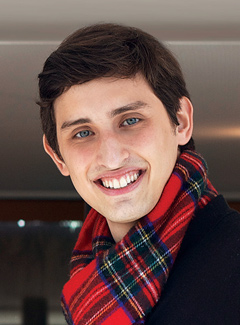Last fall, a group of volunteers transformed an empty sidewalk next to a food market loading zone into a funky, colourful public patio. This spring, they’ll complete the design. The $6,500 cost for the project, at Market 707 in downtown Toronto, was crowdfunded on Projexity, an online crowdsourcing platform that aims to help anyone to fund, design and carry out urban improvement projects in their own neighbourhood. Projexity, which launched in April 2013, is a collaboration between architect Nicolas Koff (BA 2006 Victoria) and landscape architect Marisa Bernstein, along with Koff’s brother Jonathan, a computer programmer.
How it works: An individual or group can suggest a candidate site for public landscaping or a project for urban improvement, and the public is invited to submit design ideas. After a open vote to choose three favourite designs, Projexity brings on board a team of local stakeholders – neighbours, community groups, municipal councillors, the project leader – to select the winner. The project remains on the site to gain funding and volunteers.
There are two benefits, says Koff. First, Projexity creates opportunities for rising architects. “A lot of contracts go to the same companies,” he says. “So it’s hard for a young designer to break in and change the status quo. This is a good way to allow young designers to get their designs built.”
Second, Projexity empowers citizens. “We want to get people involved, so they are not at the mercy of the city in how their space gets developed,” Koff says. “Most people don’t know how to approach an architecture firm.” Moreover, plans for municipal capital improvements are set out years in advance. Depending on the idea, a project can happen through Projexity in as little as a month or two. Projexity has funded six projects to completion and dozens more are now in the pipeline, many part of the site’s partnership with the 100 in 1 Day citizen action initiative. One group intends to replant a park area with native plants; another to organize a clothing repair event.
Projexity takes five per cent of funds raised to cover its secure hosting and web design costs, and a further one per cent fee goes into the Projexity Urban Improvement Fund to be donated to other groups. “Those funds go to projects that don’t generate as much funding,” Koff says. “This helps level the playing field because some wealthy areas might be able to raise more funds. We want to empower everyone to be involved in urban development.”
Recent Posts
For Greener Buildings, We Need to Rethink How We Construct Them
To meet its pledge to be carbon neutral by 2050, Canada needs to cut emissions from the construction industry. Architecture prof Kelly Doran has ideas
U of T’s 197th Birthday Quiz
Test your knowledge of all things U of T in honour of the university’s 197th anniversary on March 15!
Are Cold Plunges Good for You?
Research suggests they are, in three ways




